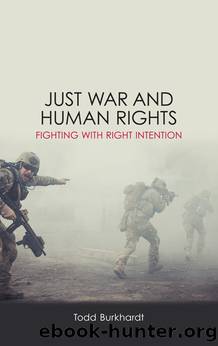Just War & Human Rights by Todd Burkhardt

Author:Todd Burkhardt [Burkhardt, Todd]
Language: eng
Format: epub
Tags: International Relations, General, Political Science, Security (National & International), Human Rights
ISBN: 9781438464022
Google: ILdGvgAACAAJ
Goodreads: 32775926
Publisher: State University of New York Press
Published: 2017-01-15T10:29:32+00:00
THE INTERNATIONAL COMMUNITY SHOULD FULFILL THIS DUTY VIA THE UN
Human rights are a practical political creation based on common ground and shared principles that are âminimum reasonable demands upon the rest of humanity.â46 If states are committed to realizing human rights, then they must be committed to protecting them. This commitment requires them to do more than simply not violate the human rights of noncompatriots. States must also act together to ensure that there is some international system in place that will reliably protect the human rights of noncompatriots, remedy violations, etc.
Without any effective international system that takes positive action to protect those rights, basic human rights will be violated by governments that either do not care or that are unable to provide for their people at one time or another.
This being the case, it is not enough for a state to be the primary obligor without any backup obligors. Having backup obligors provides a level of guarantee and protection of subsistence, basic liberty, and physical security rights that could not be met otherwise. This is important because the principle of basic human rights imposes the same duties on all states. It binds us together. Human rights are what we owe each other. Every person is a duty bearer, so if a state fails in its responsibility then others have a duty to help through the auspices of their state.
In order to manage this responsibility and coordinate behavior we have two options: (1) create a new global institution to oversee the international community, or (2) use the existing global structure that we have.
The practical choice is to use an existing global structure that is familiar with human security issues. The United Nations was instituted to facilitate cooperation between states with regard to international law, trade, security, human rights, and peace. However, âone of the reasons why States may want to bypass the Security Council is a lack of confidence in the quality and objectivity of its decision-making. The Councilâs decisions have often been less than consistent, less than persuasive and less than fully responsive to very real State and human security needs.â47 While it does seem problematic in many ways, the UN, ideally conceived, works in conjunction with regional and subregional arrangements by supporting dialogue, education, and negotiation. One major problem of the UN is that its membership includes some outlaw states and that its charterâs language is ambiguous. Also problematic is the current veto rule wielded by the permanent members of the Security Council. Furthermore, the UNâs original purpose was mainly to facilitate diplomatic engagement, not to function as a vehicle for something like R2P. However, with modifications and improvements, the United Nations can make headway in order to adequately address and remedy R2P cases.
Having an organization of states reduces the burden on any one state. Using an institution that has the organization, potential military capacity, and ability to fulfill the positive duty of enabling systems in order to prevent physical harms is a plausible way to fulfill the obligation that the basic human right of physical security demands.
Download
This site does not store any files on its server. We only index and link to content provided by other sites. Please contact the content providers to delete copyright contents if any and email us, we'll remove relevant links or contents immediately.
What's Done in Darkness by Kayla Perrin(25499)
Shot Through the Heart: DI Grace Fisher 2 by Isabelle Grey(18218)
Shot Through the Heart by Mercy Celeste(18160)
The Fifty Shades Trilogy & Grey by E L James(17774)
The 3rd Cycle of the Betrayed Series Collection: Extremely Controversial Historical Thrillers (Betrayed Series Boxed set) by McCray Carolyn(13189)
The Subtle Art of Not Giving a F*ck by Mark Manson(12905)
Scorched Earth by Nick Kyme(11831)
Stepbrother Stories 2 - 21 Taboo Story Collection (Brother Sister Stepbrother Stepsister Taboo Pseudo Incest Family Virgin Creampie Pregnant Forced Pregnancy Breeding) by Roxi Harding(11036)
Drei Generationen auf dem Jakobsweg by Stein Pia(10216)
Suna by Ziefle Pia(10185)
Scythe by Neal Shusterman(9259)
International Relations from the Global South; Worlds of Difference; First Edition by Arlene B. Tickner & Karen Smith(8608)
Successful Proposal Strategies for Small Businesses: Using Knowledge Management ot Win Govenment, Private Sector, and International Contracts 3rd Edition by Robert Frey(8418)
This is Going to Hurt by Adam Kay(7693)
Dirty Filthy Fix: A Fixed Trilogy Novella by Laurelin Paige(6450)
He Loves Me...KNOT by RC Boldt(5804)
How to Make Love to a Negro Without Getting Tired by Dany LaFerrière(5378)
Interdimensional Brothel by F4U(5303)
Thankful For Her by Alexa Riley(5159)
